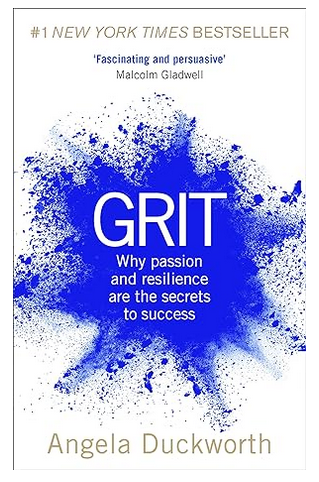In a world that often celebrates innate talent and quick success, Angela Duckworth’s Grit: The Power of Passion and Perseverance offers a refreshing and deeply insightful perspective on what it truly takes to achieve long-term success. Published in 2016, this groundbreaking book challenges the conventional wisdom that talent alone is the key to greatness. Instead, Duckworth argues that grit—a combination of passion and sustained perseverance—is the defining trait of high achievers across various fields.
What is Grit?
At its core, grit is the ability to maintain effort and interest over years despite failure, adversity, and plateaus in progress. Duckworth, a psychologist and MacArthur Fellow, defines grit as the marriage of two key components: passion and perseverance. Passion refers to a deep, enduring commitment to a goal or set of goals, while perseverance is the tenacity to keep going even when the going gets tough.
Duckworth’s research, which spans diverse domains such as education, business, and the military, reveals that grit is a better predictor of success than IQ, talent, or even socioeconomic background. Through compelling anecdotes, rigorous studies, and personal reflections, she demonstrates that grit can be cultivated and nurtured, offering hope to anyone striving to achieve their goals.
The Science Behind Grit
Duckworth’s journey into the science of grit began during her time as a teacher, where she noticed that her highest-achieving students weren’t necessarily the smartest or most talented. Instead, they were the ones who worked the hardest and refused to give up. This observation led her to pursue a PhD in psychology, where she developed the Grit Scale—a tool to measure an individual’s level of grit.
Her research shows that grit is not fixed; it can grow over time. She identifies four psychological assets that gritty individuals tend to possess:
- Interest: A genuine fascination with their work or goals.
- Practice: A commitment to deliberate practice, constantly striving to improve.
- Purpose: A belief that their work matters and contributes to the greater good.
- Hope: The resilience to keep going, even in the face of setbacks.
Duckworth emphasizes that these assets are not innate but can be developed through effort and experience. This message is particularly empowering, as it suggests that anyone can become grittier with the right mindset and habits.
Lessons from Grit
One of the most compelling aspects of Grit is its practical applicability. Duckworth doesn’t just present research; she offers actionable advice for individuals, parents, educators, and leaders to foster grit in themselves and others. Here are some key takeaways:
- Cultivate Passion: Passion often begins with curiosity. Duckworth encourages readers to explore their interests and commit to them over time. She also stresses the importance of aligning daily tasks with long-term goals to maintain motivation.
- Embrace the Hard Stuff: Gritty individuals don’t shy away from challenges. They engage in deliberate practice, focusing on their weaknesses and pushing themselves out of their comfort zones.
- Find Purpose: Connecting your work to a larger mission can provide the motivation needed to persevere. Duckworth suggests reflecting on how your efforts contribute to the well-being of others.
- Teach Grit: Parents and educators play a crucial role in fostering grit in children. Duckworth advocates for creating environments that encourage effort, resilience, and a growth mindset.
- Practice Hope: Optimism and resilience are essential components of grit. Duckworth encourages readers to view setbacks as temporary and to believe in their ability to overcome obstacles.
Criticisms and Controversies
While Grit has been widely praised, it has also faced criticism. Some argue that Duckworth’s focus on individual effort overlooks systemic barriers such as poverty, discrimination, and lack of access to resources. Critics also caution against overemphasizing grit at the expense of recognizing the importance of talent, opportunity, and luck in achieving success.
Duckworth acknowledges these concerns and emphasizes that grit is not a substitute for addressing systemic inequities. Instead, she sees it as a complementary tool that can help individuals navigate challenges and maximize their potential.
Why Grit Matters
In a culture that often prioritizes quick fixes and instant gratification, Grit serves as a powerful reminder that true success is a marathon, not a sprint. Duckworth’s message is both inspiring and practical, offering a roadmap for anyone seeking to achieve their goals through sustained effort and resilience.
Whether you’re a student, professional, parent, or simply someone striving to improve, Grit provides valuable insights into the psychology of achievement. It challenges us to rethink our assumptions about talent and success and to embrace the power of passion and perseverance. As Duckworth eloquently puts it, “Our potential is one thing. What we do with it is quite another.”
In the end, Grit is more than just a book—it’s a call to action. It invites us to reflect on our own goals, to commit to the long haul, and to find joy in the journey. After all, as Duckworth reminds us, “Enthusiasm is common. Endurance is rare.” And it is endurance, fueled by grit, that paves the way to greatness.
Image Credit : Photo by Dylan Flying

